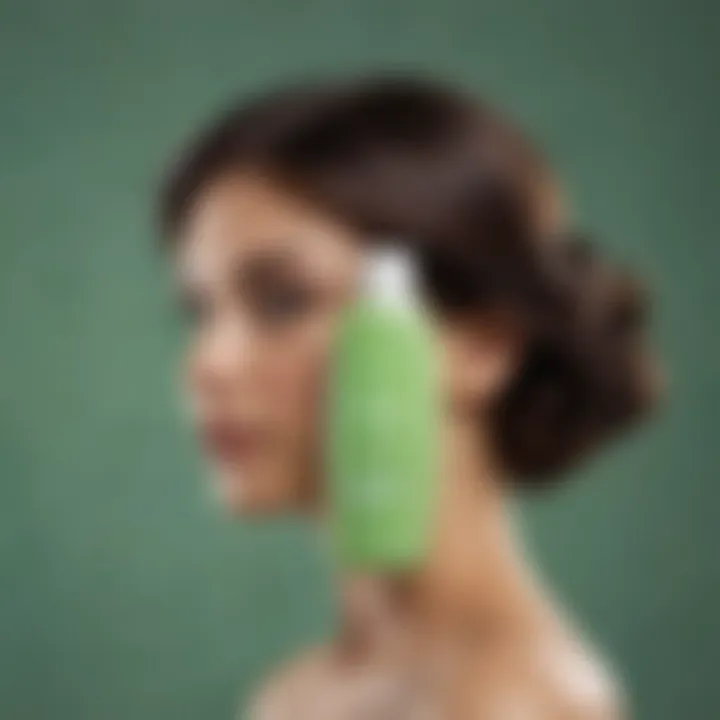Sodium Lauryl Sulfate-Free Shampoos: Benefits and Choices


Intro
In the world of hair care, finding the right products can feel like searching for a needle in a haystack. With countless options on the shelves, it's crucial to sift through the noise and understand what really matters for your hair. One ingredient that often stirs up quite the debate is sodium lauryl sulfate (SLS). It’s a widely used cleansing agent in many shampoos, but it has also come under fire for potential adverse effects, particularly on delicate scalps and hair types. As consumers become more conscious about the ingredients they apply to their bodies, sulfate-free shampoos are gaining traction.
This article digs deep into the sulfate-free segment of shampoos, examining their myriad benefits and potential pitfalls. We’ll uncover why individuals are turning their backs on products with SLS and what makes these alternatives ideal for various hair types. As we weave through the intricacies of sulfate-free options, you’ll also discover key ingredients that can bolster hair health and the ties these choices have to environmental sustainability. By the end of this journey, our aim is to equip you with the knowledge required to make informed decisions about your hair care routine, leading to healthier, more vibrant locks.
Tips and How-Tos
Choosing the Right Shampoo for Your Hair Type
Each head of hair is unique, much like snowflakes or fingerprints. Therefore, understanding your hair type is the first step in selecting the perfect sulfate-free shampoo. Here are some tips:
- Fine Hair: If your hair lacks volume and tends to get oily, opt for lightweight formulas. Ingredients like chamomile can help without weighing it down.
- Curly or Wavy Hair: Look for shampoos rich in moisture and nourishment. Olea Europaea (olive) oil and shea butter can provide hydration and help define your curls.
- Color-Treated Hair: Gentle, sulfate-free formulas with protective properties, such as sunflower oil, can prevent color from fading while keeping your hair healthy.
- Sensitive Scalp: If your scalp is reactive or dry, look for shampoos with calming ingredients like aloe vera or calendula.
Incorporating Sulfate-Free Shampoos into Your Routine
Transitioning to sulfate-free shampoos is straightforward. Here’s how to ease into it:
- Start with a sulfate-free shampoo to cleanse your hair.
- Follow up with a sulfate-free conditioner that complements your chosen shampoo.
- Wash your hair less frequently to let its natural oils hydrate it.
- Pair with occasional deep conditioning treatments for added moisture.
- Always check ingredient labels to ensure you're making the healthiest choice.
Remember, each step counts towards healthier hair.
Sustainable Practices
The Importance of Eco-Friendly Choices
As we become more mindful of the products we use, sustainability in hair care is increasingly vital. Choosing sulfate-free shampoos not only benefits your hair but also the planet. Many sulfate-free brands prioritize eco-conscious production methods, making sustainability a part of their identity.
When picking products, look for:
- Recyclable packaging
- Ingredients sourced responsibly
- Brands that commit to reducing their carbon footprint
Supporting Sustainable Brands
Here are some notable sulfate-free and eco-friendly brands to consider:
- Aveda: Known for their botanical-based formulas and commitment to sustainability.
- Burt's Bees: Emphasizes natural ingredients and promotes environmental responsibility.
- Herbal Essences: Offers a variety of sulfate-free options that are also certified organic.
Celebrating Diversity in Beauty
Recognizing Different Hair Types
In today’s beauty landscape, recognizing the diversity in hair types is essential. No one-size-fits-all approach exists, and celebrating each unique texture, curl, or wave can foster inclusivity in products. Brands that cater to a wide array of hair types are becoming increasingly popular.
Inclusive Beauty Brands
- Fenty Beauty: Aids in promoting haircare products for all textures.
- SheaMoisture: Celebrates natural beauty while providing options for textured hair.
Understanding that beauty is diverse enables consumers to make choices that align with their personal identity and hair care needs.
By diving into the attributes of sodium lauryl sulfate-free shampoos, we empower ourselves to select products that align with our values and needs, leading the way for healthier hair and a greener planet.
Understanding Sodium Lauryl Sulfate
Sodium Lauryl Sulfate, or SLS, is an ingredient that has sparked a multitude of opinions and discussions in the realm of personal care products, particularly shampoos. Grasping the essence of SLS is crucial for the consumers who are on the lookout for hair care solutions that align with their health and ethical beliefs. Understanding SLS helps in differentiating between the shampoos that can strip away your hair's natural oils and those that maintain its integrity.
Definition and Common Uses
SLS is a surfactant, which means that it helps in breaking down oils and dirt so they can be washed away with water. You can think of it as the hardworking force behind the lathering action of many shampoos and cleansers. It’s commonly used in a wide range of personal care items including shampoos, body washes, and even toothpastes. This ingredient is appreciated for its ability to create a rich foam, making it a go-to for manufacturers looking to achieve that clean sensation that consumers crave.
Many popular shampoo brands incorporate SLS for that very reason. It's effective, and it gets the job done; however, it's also known to cause dryness and irritation in sensitive individuals.
Controversy Surrounding SLS
Despite its effectiveness, SLS has come under scrutiny. Some studies suggest that it may irritate the skin, scalp, and eyes. Moreover, the debate intensifies when discussing its impact on hair health. For people with chemically treated or naturally dry hair, SLS could be akin to pouring salt on a wound. The stripping properties of the ingredient can lead to a plethora of issues such as frizz, breakage, and an overall lackluster appearance.
The growing concern around SLS has given momentum to the sulfate-free movement. People want gentle, effective alternatives that preserve their natural oils rather than wash them down the drain. Notably, there are options available that offer a less harsh experience without compromising on cleanliness.
"Understanding the role of Sodium Lauryl Sulfate is pivotal in today’s health-conscious world. It's not just about cleansing; it’s about ensuring your hair’s vitality."
Navigating the world of shampoos entails being aware of what ingredients are present. For many, switching to sodium lauryl sulfate-free shampoos feels like a leap toward a healthier lifestyle. In the following sections, we’ll dig deeper into the shift towards sulfate-free products, benefits associated with them, and how to choose the right option suited to different hair types.


In doing so, consumers will be better equipped to make well-informed decisions, ensuring their hair care choices truly reflect their needs.
The Shift to Sulfate-Free Products
In recent years, there has been a significant move towards sulfate-free hair care products. This shift is not just a trend but represents a growing understanding of the potential consequences of using certain chemicals in our daily routines. Sodium Lauryl Sulfate (SLS), a commonly used cleaning agent found in various products, has faced mounting scrutiny. This has led consumers to seek alternatives that promise a gentler approach without compromising effectiveness.
Reasons for the Transition
Numerous factors are driving the change towards sulfate-free shampoos, each reflecting a desire for healthier choices. Here are some key reasons:
- Health Concerns: People are becoming increasingly aware of the ingredients in their personal care products. Many have reported skin irritations, dryness, or allergic reactions due to SLS. Moving to sulfate-free formulas can reduce these risks significantly.
- Natural Beauty Movement: The wellness trend has encroached upon beauty care. Some individuals prefer using natural or organic products, seeking peace of mind in what they apply to their skin and hair. Sulfate-free shampoos often align with this philosophy.
- Long-Term Hair Health: Regular use of sulfates can strip hair of its natural oils. Over time, this can lead to damage, increased frizz, and an overall dull appearance. By opting for sulfate-free products, one can maintain the hair's natural moisture balance, promoting healthier, shinier locks.
- Environmental Awareness: Many consumers are also making choices based on environmental impacts. Sulfates can be harmful to aquatic life when washed off and enter the water system. Choosing sulfate-free products can reflect a commitment to ecological stewardship.
Consumer Awareness and Demand
With the rise of social media and online platforms, information spreads faster than ever. Consumers today are not only empowered but also critical of what they purchase. The demand for sulfate-free products is a response to this increased awareness.
"Knowledge is power, and in the realm of hair care, awareness is driving consumers to demand better ingredients."
- Influencer Impact: Beauty influencers and health advocates have played a role in raising awareness about sulfate's potential harms. Their recommendations can prompt others to rethink their choices.
- Product Labels: As more brands highlight their sulfate-free status, it’s become a significant selling point. Shoppers are now more inclined to scrutinize ingredient lists, turning to those shampoos that clearly state they are free from harmful sulfates.
- Personal Experiences: Testimonials about the benefits of sulfate-free products are common on forums and social media. Many users share their positive transitions, influencing their peers and contributing to a growing community that values gentler options.
Through these discussions and shared experiences, an informed consumer base has emerged, driving the market toward sulfate-free solutions. Understanding why this shift occurs is crucial for both consumers and brands in meeting a demand for healthier hair care alternatives.
Benefits of Sodium Lauryl Sulfate-Free Shampoos
In recent years, an increasing number of people have become aware of the potential drawbacks associated with traditional shampoos containing sodium lauryl sulfate (SLS). This article highlights why sulfate-free options are not just a passing trend, but an essential shift in personal care practices. The benefits of these formulations span across comfort, hair quality, and even broader topics like environmental awareness. By understanding these advantages, consumers can make educated choices tailored to their individual needs and preferences.
Reduced Irritation
One of the primary benefits of using shampoos that do not contain sodium lauryl sulfate is the significant reduction in scalp irritation. Many individuals suffer from sensitivity to SLS, which can lead to redness, itchiness, or even flaking. When harsh chemicals are stripped away, the gentle cleansing agents found in sulfate-free shampoos provide a more soothing experience.
- Gentle Alternatives: Ingredients like coco-glucoside and decyl glucoside serve as mild replacements. They clean without upsetting the delicate balance of your scalp and hair.
- Ideal for Sensitive Scalps: This gentler approach means that even those with conditions such as eczema or psoriasis can benefit. Instead of exacerbating their symptoms, these shampoos help maintain a tranquil environment for their skin.
Moreover, reduced irritation extends beyond just shampoo use; it can lead to an overall healthier scalp. A healthy scalp is crucial for fostering robust hair growth, making this change advantageous for anyone looking to improve their hair's foundational health.
Maintaining Natural Oils
Another important consideration when selecting a shampoo is how it interacts with the hair's natural oils. Traditional SLS shampoos often strip away these vital substances, leading to an overproduction of oils or excessively dry strands. In contrast, sulfate-free shampoos help to retain those natural oils, thereby promoting a healthier appearance and feel.
- Hydration Retention: Since these shampoos do not completely eliminate oil, hair can appear shinier and more nourished. The lovely balance of retention promotes softness and manageability.
- Reduced Greasiness: You may find that when your scalp is not over-irritated by harsh cleansing, it adjusts more successfully to maintaining oil levels without becoming overly greasy.
By fostering an environment where natural oils can thrive, sulfate-free shampoos cater to the diverse needs of various hair types ranging from straight to wavy, curly, and coily textures.
Enhancing Hair Health
Beyond immediate comfort and oil balance, sulfate-free shampoos contribute to long-term hair health. Formulations with thoughtful, nourishing ingredients have risen in popularity, offering a range of benefits for strong and lush locks.
- Nourishment with Natural Ingredients: Many sulfate-free shampoos infuse beneficial compounds like aloe vera, jojoba oil, and coconut oil. These natural elements support not just surface-level improvements but also deeper health.
- Minimized Damage: This approach also aligns well with color-treated and chemically processed hair, which is often already under duress. By avoiding harsh sulfates, these formulations help to preserve color and reduce the likelihood of breakage.
"Choosing sulfate-free shampoos is not just about avoiding irritation; it's an investment in your overall hair health and long-term appearance."
Identifying the Right Shampoo for Your Hair Type
Selecting the right shampoo isn’t just about grabbing the latest bottle off the shelf. It's about understanding your unique hair type and its specific needs. Using a shampoo tailored to your hair's characteristics can significantly improve its health, appearance, and manageability. Sulfate-free shampoos are increasingly popular for their gentler formulas. Knowing how to identify the right one for you can save you time, money, and the frustration of trial and error. Let's break down how different hair types require different approaches when shopping for sulfate-free options.
Dry and Damaged Hair
For those with dry or damaged hair, hydration is key. Sulfate-free shampoos designed for this hair type often contain rich, moisturizing ingredients such as argan oil or shea butter. These elements help to lock in moisture and repair damage while providing nourishment. Look for terms like "moisturizing" or "repairing" on the label.
Users might also consider shampoos with ingredients like coconut oil or aloe vera, which can soothe the scalp and add that much-needed hydration. When encountering product options, remember: if the shampoo leaves your hair feeling squeaky clean yet dry afterward, it’s not the right fit. A good sulfate-free shampoo should cleanse without stripping the hair of its natural oils.
Oily Hair
Those with oily hair often think that washing more frequently is the solution. However, overdoing it can lead to a vicious cycle of oil production. Opting for a sulfate-free shampoo that is lightweight and designed for oily hair can prevent your hair from becoming too stripped. Many formulations for oily hair contain ingredients like tea tree oil or lemongrass, which are known for their ability to balance oil production.
Here’s a tip: Look for clarifying sulfate-free shampoos that promise deep cleansing without the harsh chemicals. These options will help in reducing shine and maintaining freshness between washes, while still keeping your hair healthy.
Color-Treated Hair
Color-treated hair requires a gentle approach, as dyes can alter the hair's structure and leave it more vulnerable. Using sulfate-free shampoos specifically formulated for color-treated hair helps maintain color vibrancy and prevents fading. Ingredients like sunflower extract and jojoba oil are often labeled as protective agents that shield the hair.
Don't forget to check for pH-balanced products, as they help preserve that expensive dye job. Many shampoos claim to be color-safe, so look for those that specifically mention "sulfate-free" to ensure you’re not sacrificing your color’s integrity while keeping harsh ingredients at bay.
Ultimately, understanding your specific hair type is crucial for choosing the right sulfate-free shampoo. Tailoring your choice not only enhances your hair health but also boosts its overall appearance.


Top Sodium Lauryl Sulfate-Free Shampoo Recommendations
As the interest in sulfate-free shampoos continues to grow, the array of products available on the market becomes increasingly diverse. Consumers seeking to avoid sodium lauryl sulfate (SLS) often find an overwhelming sea of choices. This section cuts through the clutter and aims to provide insights into notable recommendations of sulfate-free shampoos that have garnered attention for their effectiveness and properties. Understanding which products excel in what they offer can save time and enhance your hair care routine.
Luxury Brands
Luxury shampoos often promise a blend of quality ingredients that cater to the affections of hair care aficionados. Brands like Oribe and Kerastase stand out among the luxury options, frequently earning accolades for their luxurious feel and sophistication.
Oribe Gold Lust Repair & Restore Shampoo combines natural ingredients like coconut oil and maracuja oil, delivering hydration and repairing damage—perfect for adding radiance to lackluster locks. Kerastase’s Bain Satin 2 provides nourishment while ensuring the hair remains soft and bouncy, making it suitable for dry hair types.
These shampoos come with a higher price tag, but the added benefits justify the cost for many. Their unique formulations mean they often feature enhanced fragrance profiles, leaving hair smelling divine, to boot.
Drugstore Options
Not everyone wants to splurge on hair care products, and that’s where drugstore options come into play. Brands like L’Oreal and Pantene have stepped up to the plate with compelling sulfate-free formulas.
For example, L’Oreal’s EverPure Sulfate-Free Shampoo targets color-treated hair, providing a gentle cleanse without stripping color. This is especially relevant as color care becomes crucial for many. Meanwhile, Pantene’s Pro-V Blends offer a budget-friendly choice with nourishing ingredients like argan oil that keep hair shiny and manageable.
The affordability and availability of these shampoos make them attractive options for those who desire effective cleansing without breaking the bank. They are widely accessible and provide reliable performance, linking quality with convenience.
Eco-Friendly Products
Eco-conscious consumers don't need to compromise on quality when it comes to sulfate-free shampoos. Brands such as Ethique and Acure focus on sustainable practices, aiming to reduce waste and environmental impact.
Take Ethique’s Eco-Conscious Shampoo Bar—a solid bar format that eliminates plastic entirely. It’s formulated with natural ingredients like cacao butter and essential oils, offering a zero-waste solution that lathers beautifully. Acure’s Curiously Clarifying Shampoo combines quality ingredients like lemongrass and coastal sea kelp, making it a refreshing choice that champions both hair and planet.
Choosing eco-friendly brands can enhance not just your beauty regime but also your environmental footprint. It reflects a growing trend toward sustainability in personal care—an ethos that resonates with an increasing number of consumers.
In a world where options abound, selecting the right sulfate-free shampoo should hinge on individual needs and preferences. Whether it's the luxurious allure of high-end brands, the exceptional value of drugstore picks, or the commitment to the environment with eco-friendly options, there’s a shampoo out there for everyone. Each choice brings its unique benefits and shades of efficacy, crafting personalized hair care journeys.
Key Ingredients to Look for
When it comes to sodium lauryl sulfate-free shampoos, understanding key ingredients is essential for making informed choices about hair care. The right components can enhance the benefits of a sulfate-free formula. As consumers become more ingredient-conscious, knowing what to look for helps in achieving silky, vibrant hair without compromising health or nature.
Natural Cleansing Agents
Natural cleansing agents serve as the backbone of sulfate-free shampoos, providing the cleaning power needed to wash away dirt and oils without stripping hair of its natural moisture. Ingredients like cocamidopropyl betaine and decyl glucoside are excellent choices, derived from coconut and corn, respectively. Both offer gentle yet effective cleansing properties that respect the scalp's natural balance.
It's important to note that while these agents are soothing, their efficiency varies. Some users may find that these shampoos require a bit more effort to lather, though the end result – hair that feels clean but unscathed – often proves worthwhile. In addition, natural cleansing agents are less likely to cause the scalp irritation associated with harsher surfactants. They are generally well-suited for everyone, especially those with sensitive skin or color-treated hair.
Hydrating Ingredients
Hydrating ingredients play a crucial role in maintaining a healthy mane, especially in sulfate-free shampoos. Look for products containing aloe vera, glycerin, and hyaluronic acid. Each of these ingredients excels at attracting and retaining moisture, which can prevent dryness and frizz.
- Aloe Vera: This plant ingredient is not just a trend; it cools and soothes the scalp while providing hydration and strength to the hair shaft. It's also packed with vitamins and minerals that contribute to overall hair health.
- Glycerin: A natural humectant, glycerin draws moisture from the environment and locks it into the hair. When used effectively, it can make frizzy hair manageable and boost shine.
- Hyaluronic Acid: Known for its powerful hydrating abilities, this ingredient keeps hair feeling plump and refreshed.
These hydrating elements are particularly beneficial for individuals with dry, curly hair that often craves moisture.
Nourishing Additives
Adding nourishing additives turns a good shampoo into a great one. Ingredients like keratin, vitamin E, and botanical oils, such as argan or jojoba oil, nourish the hair and promote its health.
- Keratin: This protein helps to reconstruct and strengthen damaged hair. Over time, it can make hair smoother and more resilient against breakage.
- Vitamin E: This powerhouse antioxidant not only helps in protecting hair from environmental damages but also supports healthy growth and scalp health.
- Argan Oil: Famous for its rich emollient properties, argan oil repairs and rejuvenates dry hair while enhancing shine.
- Jojoba Oil: Similar to the natural oils produced by our scalp, jojoba oil is known for its ability to balance oil production, making it perfect for all hair types.
As you explore different shampoos, keep these key ingredients in mind. They can make all the difference between a shampoo that merely cleanses and one that rejuvenates and revitalizes your hair. It’s about finding that perfect balance between cleansing, hydrating, and nourishing, all of which help achieve healthy, beautiful hair.
Potential Drawbacks of Sulfate-Free Shampoos
While sodium lauryl sulfate-free shampoos are gaining popularity for their gentler approach to hair care, it's crucial to also understand the potential drawbacks associated with them. Evaluating both pros and cons characterizes a well-rounded consumer, particularly when it comes to personal care products. So, let’s dive into the specific elements that warrant attention when considering the switch to sulfate-free options.
Cost Considerations
One of the primary deterrents many face when considering sulfate-free shampoos is their price point. Generally, these products sit at the higher end of the market. Unlike basic shampoos that often contain harsh surfactants, sulfate-free formulations typically incorporate more natural ingredients, which can drive costs up. Brands like Burt's Bees or Aveda may charge more for their products due to their sourcing and manufacturing processes.
Moreover, the transition from a traditional shampoo to a sulfate-free alternative may require consumers to purchase an accompanying conditioner or treatment, thus increasing overall spending on hair care. This investment in quality often pays off in the long run, yet the initial financial output may cause pause.
"Investing in sulfate-free shampoos is like laying the groundwork for better hair health in the future. What you spend today could save you money on salon treatments later."
Variability in Performance
Another significant factor is the variability in performance. While some women might find their hair feeling softer and healthier after using sulfate-free shampoos, others might experience a less favorable outcome, leading to frustration. Certain users find that these shampoos don't lather as well, leaving them feeling as though their hair isn’t as clean as they would expect.


Moreover, finding the right sulfate-free shampoo is subjective and can be a bit of a trial-and-error journey. Different formulations may work wonders for one hair type but fall flat for another. For instance, a person with oily hair might still feel greasy after washing, while someone with dry hair may find sufficient hydration.
This inconsistency across brands and product lines can lead consumers to wonder if they're wasting time or money on a solution that doesn't fit their needs. It emphasizes the importance of reading reviews and doing a bit of research before settling on a particular product. It’s all about the right fit for your unique hair and scalp type, a task that can often feel akin to searching for a needle in a haystack.
In summary, while the benefits of sulfate-free shampoos are plenty, there are hurdles—both financial and functional—that consumers should weigh carefully. Taking into consideration these potential drawbacks will empower individuals to make informed choices that align with their hair care priorities.
Environmental Impact
Understanding the environmental implications of hair care products, particularly sodium lauryl sulfate-free shampoos, is crucial in today's context. With the increasing concerns about pollution and ecosystem health, consumers are becoming more discerning about what goes into their products and, subsequently, the impact on our planet.
Sustainability Issues in Hair Care
The hair care industry has long been under scrutiny for its role in environmental degradation. Many conventional shampoos, including those with sodium lauryl sulfate, not only harm individual hair health but can also negatively affect ecosystems. The ingredients in these products can find their way into water systems during the manufacturing process or through consumer use, leading to potential harm to aquatic life. Moreover, the production processes for synthetic ingredients often involve high water use and toxic byproducts, further stressing the importance of sustainable practices in the industry.
In contrast, sulfate-free shampoos often employ more natural ingredients that tend to be less harmful to the environment. Brands focusing on sustainability take great care to source their ingredients responsibly. They often avoid harmful chemicals that can leach into groundwater or disrupt local ecosystems. Instead, they favor plant-based cleansers and biodegradable formulations that minimize environmental impact. This shift not only serves hair health but also represents a commitment to our planet's well-being.
"Choosing products with natural ingredients supports a healthier environment for future generations."
Additionally, packaging plays a significant role in sustainability. Excessive plastic use is another concern with many traditional shampoos. Sulfate-free brands often look at minimalist or recyclable packaging, thus reducing their overall carbon footprint.
Choosing Eco-Conscious Brands
When selecting sulfate-free shampoos, it's important to consider brands that prioritize eco-friendliness along with product performance. Here are some tips and factors to keep in mind:
- Ingredients: Look for labels with recognizable, natural components. Ingredients like aloe vera, coconut oil, and essential oils not only benefit hair but are also less likely to cause environmental harm.
- Certifications: Brands certified by reputable organizations for organic or cruelty-free practices often adhere to stricter environmental standards. Certification can signal commitment to sustainability.
- Local Sourcing: Eco-conscious brands often source their ingredients locally, reducing transportation emissions and helping to support local economies.
- Transparent Practices: Choose brands that are open about their manufacturing processes and environmental impacts. Transparency fosters trust.
In a world that's constantly evolving, being mindful of our choices can lead to healthier hair and a vibrant planet. The options are increasingly available, making the decision to switch to sulfate-free shampoos not just a personal choice but a collective step towards a sustainable future.
The Future of Hair Care Products
As we look to the future of hair care, it's clear this is a pivotal time for consumers and manufacturers alike. The growing awareness around personal health and environmental sustainability has propelled sulfate-free products to the forefront. This article's focus on sodium lauryl sulfate-free shampoos highlights a broader movement towards cleaner, safer, and more considerate choices in personal care. The emphasis is no longer just on what works, but also on what is safe for our bodies and the planet.
One of the main elements in this evolution is the introduction of innovative formulations. These shampoos not only meet consumer expectations for performance but also align with new values centered around health and ecology. Innovations are not merely about changing ingredients; they also encompass new ways of thinking about hair health, ingredient sourcing, and product sustainability.
In addition to formulation, consumer preferences are also transforming, largely driven by a thirst for knowledge and transparency in the beauty industry. People are looking for products that reflect their values, whether that’s selecting options free from harmful chemicals or those with minimal packaging.
"Sulfate-free is no longer a trend, but a cornerstone of modern hair care choices."
This leads us to the two main focuses when discussing the future—innovations in sulfate-free formulations and the prevailing consumer trends influencing these products.
Innovations in Sulfate-Free Formulations
The landscape of hair care is undergoing a significant transformation, particularly in the realm of sulfate-free formulas. New technologies and natural alternatives are stepping in to create effective yet gentle cleansing agents. Ingredients such as cocamidopropyl betaine and decyl glucoside are gaining traction. They provide a similar cleansing effect without the harshness associated with traditional sulfates.
Moreover, formulators are experimenting with plant-derived extracts such as aloe vera or green tea, infusing shampoos with additional benefits like nourishment and protection. The innovations aren't just about being gentle on the hair; it’s also about preserving the scalp’s natural microbiome. Scalp health is emerging as a critical component of overall hair care, promoting the idea that healthy hair starts at the roots.
Here are a few noteworthy innovations:
- Bioengineered ingredients: Advanced science is helping create cleaner, more sustainable alternatives to sulfate-based ingredients.
- Customizable formulations: Brands are beginning to offer personalized options, allowing users to select ingredients based on hair type and specific needs.
- Sustainably sourced components: There's an emerging focus on using ethically harvested materials, reducing the ecological footprint of hair care products.
Consumer Trends and Preferences
Consumer behavior in the beauty space is becoming increasingly sophisticated. Today's shoppers are well-informed, often seeking products that align with their values—considerations that go beyond mere performance.
A few critical shifts in consumer trends include:
- Increased preference for transparency: Buyers are looking for clear labeling, understanding what goes into their products and where those ingredients come from.
- Strong demand for eco-friendliness: There is a noticeable inclination towards brands that prioritize sustainable packaging and environmental responsibility.
- Focus on health and wellness: More consumers are considering the impact of ingredients on their health; the move away from sulfates reflects a broader trend towards holistic wellness.
As these trends continue to unfold, the hair care industry is likely to respond with even more innovations that cater to the informed consumer. The future of hair care products, particularly sulfate-free options, seems promising, blending cutting-edge science with consciously sourced ingredients.
The End and Recommendations
When it comes to choosing the right hair care products, the conversation surrounding sodium lauryl sulfate-free shampoos cannot be underestimated. Shifting the focus from conventional formulations that often include this ingredient opens up a realm of benefits—benefits that cater to both personal well-being and environmental sustainability. The importance of understanding these shampoos extends beyond just preference; it’s about making informed decisions that affect our health, finances, and planet.
Taking into account the considerations outlined in this article, it becomes evident that opting for sulfate-free shampoos can lead to significant improvement in hair health. Many users find that it reduces scalp irritation and helps maintain natural oils within the hair, resulting in a healthier appearance. Not only do these changes enhance the quality of individualized hair care, but they also align with growing consumer demand for eco-conscious products. Consequently, this trend has pushed brands to innovate their ranges, offering solutions tailored to different needs and hair types.
Another element worth mentioning is the shift that has occurred in the marketplace. There's no longer a one-size-fits-all approach. Instead, consumers have a variety of products to examine based on their unique hair conditions—be it dryness, color treatment, or oily scalp issues. This vastly improves the selection process, allowing for better outcomes when it comes to personal grooming.
In summary, the insights provided in this article serve as a guide in your journey towards healthier hair choices. Choosing shampoos free from sodium lauryl sulfate is not merely a trend; it's a step towards reinforcing natural beauty while respecting our environment.
"When in doubt, choose products that align with both your hair’s needs and the planet’s future."
Final Thoughts on Hair Care Choices
As we reach the end of our exploration into sodium lauryl sulfate-free shampoos, it warrants a mention that conscientious hair care is fundamentally tied to various life aspects. It's crucial to consider your hair type when selecting a shampoo but also essential to understand the chemical composition of the products we apply daily.
Using sulfate-free options often means more gentle care, aligning with the body's need for balance. With ingredients that nourish rather than strip away essential oils, these shampoos not only support external beauty but ensure long-term health. Therefore, the recommendations provided, along with an understanding of environmental considerations, lead to a more holistic approach to hair care.
Lastly, as this article underscores, the conversation about hair products is evolving, shaped by consumer awareness and environmental consciousness. Embracing sulfate-free shampoos represents not just a personal choice but a broader commitment to healthier living and sustainability. Make choices that support your hair goals while being kind towards Mother Earth.







